
Adam Guettel and Craig Lucas’ The Light In The Piazza is the most exquisite musical to come from Broadway in many years. The story of a mother and daughter who travel to Italy in the summer of 1953, Piazza was nominated for eleven Tony awards in 2005 and won six, including one for Guettel’s score. Most of its other wins were in design categories, most notably for Michael Yeargan’s superb scenic design. In fact, the Broadway and touring company sets were so breathtakingly beautiful that at times they may even have overshadowed the material, particularly Lucas’ complex, haunting music.
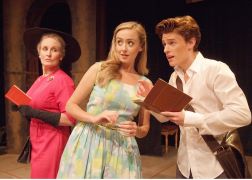 Stripped of its predecessors’ much talked-about scenic designs, YMTA Productions’ almost-in-the-round intimate staging at the El Portal Forum Theatre, directed with assurance and imagination by William Robert Ewing, places the emphasis on Guettel’s gorgeous score, Lucas’ touching book, and some memorable star performances, adding up to a Light In The Piazza which comes straight from the heart and which touches the heart in equal measure.
Stripped of its predecessors’ much talked-about scenic designs, YMTA Productions’ almost-in-the-round intimate staging at the El Portal Forum Theatre, directed with assurance and imagination by William Robert Ewing, places the emphasis on Guettel’s gorgeous score, Lucas’ touching book, and some memorable star performances, adding up to a Light In The Piazza which comes straight from the heart and which touches the heart in equal measure.
Pivotal to Piazza’s success is its leading lady’s performance as Margaret Johnson, a well-to-do tobacco executive’s wife whose mother-daughter vacation in Florence becomes the catalyst for major changes in her daughter Clara’s life, and in her own as well.
Victoria Clark won the Tony for playing Margaret on Broadway, a performance I had the privilege to see at Lincoln Center. Having seen two other Margarets in the interim, I’d venture to say that YMTA’s Mary Donnelly Haskell is the best of the bunch, and that’s saying a lot.
Haskell brings a rich, resonant soprano to the role, but what sets her Margaret apart from the others are Haskell’s superb acting chops and comedic timing, honed in many non-musical TV appearances. That Haskell shares with Margaret a Southern upbringing adds extra layers to her performance.
The actress captures Margaret’s dry humor in many asides to the audience, whether remarking on the idiosyncrasies of the Italians she meets, or commenting, after a particularly trying day, “It’s for nights like this that hotel bars were specifically made.” Haskell’s rendition of “Dividing Day,” in which she sings about the falling apart of her “perfect” marriage, is devastating.
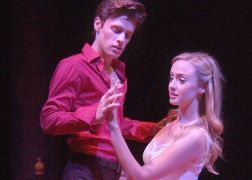 As Clara, Stephanie Wall returns to the El Portal stage where she appeared numerous times as one of the Marvelous Wonderettes’ “Wonderstudies.” Besides the lovely soprano she brings to numbers like “The Beauty Is” and the title song, Wall makes you believe that Clara is indeed a 12-year-old girl inside the body of a 20something young woman, from her innocent joy and wonder at the beauties of Italy to her petulance at not getting her own way to her terror at finding herself lost at night in the streets of Florence, where the only words she can cry out again and again are her name and address, just as Mother had taught her. This is lovely work from an up-and-coming musical theater leading lady.
As Clara, Stephanie Wall returns to the El Portal stage where she appeared numerous times as one of the Marvelous Wonderettes’ “Wonderstudies.” Besides the lovely soprano she brings to numbers like “The Beauty Is” and the title song, Wall makes you believe that Clara is indeed a 12-year-old girl inside the body of a 20something young woman, from her innocent joy and wonder at the beauties of Italy to her petulance at not getting her own way to her terror at finding herself lost at night in the streets of Florence, where the only words she can cry out again and again are her name and address, just as Mother had taught her. This is lovely work from an up-and-coming musical theater leading lady.
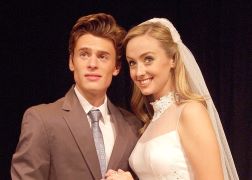 In the role of Clara’s Florentine Prince Charming, Blake McIver Ewing is easily the best of the five Fabrizios I’ve seen. It’s refreshing to finally have a Fabrizio who looks the character’s age, and despite a lengthy film and TV career that spans back to a 1993 appearance in the movie Calendar Girl (as “6-year-old Ned”) and numerous episodes of Full House (as pint-sized Derek Boyd), Ewing is still only a few years older than Fabrizio’s twenty.
In the role of Clara’s Florentine Prince Charming, Blake McIver Ewing is easily the best of the five Fabrizios I’ve seen. It’s refreshing to finally have a Fabrizio who looks the character’s age, and despite a lengthy film and TV career that spans back to a 1993 appearance in the movie Calendar Girl (as “6-year-old Ned”) and numerous episodes of Full House (as pint-sized Derek Boyd), Ewing is still only a few years older than Fabrizio’s twenty.
The striking young actor captures every iota of Fabrizio’s boyish charm, his love-at-first-sight passion for Clara, and his flair for the dramatic, which he shows off in a bravura “Il Mondo Era Vuoto,” an operatic declaration of love which has Ewing on his knees at one point, hands extended to God, and not long after, cupping his father’s face in his hands, his Dad being the next best thing to Clara at that particular moment. Ewing is handsome, endearing, and a phenomenal singer to boot.
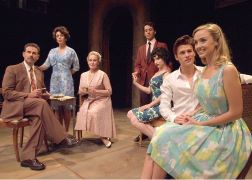 Fabrizio’s family members are drawn here with broader strokes than in previous Piazzas I’ve seen, and for a moment or two, I worried that they might be moving into caricature, but I soon fell under the spell of their passionate Italian-ness, and since the entire family is on the same page performance-wise, their larger-than-life performances work.
Fabrizio’s family members are drawn here with broader strokes than in previous Piazzas I’ve seen, and for a moment or two, I worried that they might be moving into caricature, but I soon fell under the spell of their passionate Italian-ness, and since the entire family is on the same page performance-wise, their larger-than-life performances work.
Christine M. Capsuto has the great good fortune to play Franca, Fabrizio’s fiery sister-in-law, easily one of the best supporting roles for an actress in a musical since Anita in West Side Story, and she sings and acts it to sizzling perfection. Dashing Darius Rose has great fun with the role of Giuseppe, Franca’s philandering young husband. Rose and Capsuto have great chemistry together, making it clear that however much Giuseppe’s eye may wander, each would kill tigers for the other.
Jonathan Kruger combines humor and warmth as Fabrizio’s father, and makes for a truly dashing (semi-)love interest for Margaret in the movie star tradition of Rossano Brazzi and Marcello Mastroianni.
As Signora Naccarelli, a wonderful Dena Drotar nails the scene-stealing “Aiutami” in which the non-English speaking Signora explains the melodramatic goings-on in the Naccarelli family to the non-Italian speaking audience.
All of the Naccarellis speak and sing in an entirely credible Italian.
Gregory Franklin does fine work in his two scenes as the show’s only non-singing character, Margaret’s back-in-America husband Roy.
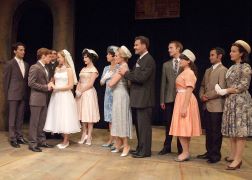 The excellent cast is completed by Mark Gamez (Priest), Lori Merkle Ford (Tour Guide), Eric De Anda, Fiona Landers, and Harrison Meloeny, playing multiple roles and singing beautiful harmonies under Michiko Hill’s first-rate musical direction. Hill (on piano) leads a fine 5-piece orchestra, which also includes Grace Beak (violin), Joe Deblasi (guitar), Steve Goomas (keyboard [harp]), and Pee Wee Hill (bass). As an added plus, the entire cast sings unamplified.
The excellent cast is completed by Mark Gamez (Priest), Lori Merkle Ford (Tour Guide), Eric De Anda, Fiona Landers, and Harrison Meloeny, playing multiple roles and singing beautiful harmonies under Michiko Hill’s first-rate musical direction. Hill (on piano) leads a fine 5-piece orchestra, which also includes Grace Beak (violin), Joe Deblasi (guitar), Steve Goomas (keyboard [harp]), and Pee Wee Hill (bass). As an added plus, the entire cast sings unamplified.
The El Portal Forum’s intimate horseshoe seating arrangement creates a scenic design challenge. Christopher Scott Murillo’s set is pretty much an in-the-round use of chairs, desks, tables, a bed, a tie rack (for the Naccarelli shop), a painting, a naked statue of the David, etc. in front of a black curtain with an arched doorway and a few shuttered windows hanging from above to lend an Italian feel. It’s a design that does precisely what it’s supposed to, given the limitations posed by budget and venue. The only real drawback is that scene changes (swiftly effected by cast members) pose an occasional distraction during some songs.
Costumes by Patricia Jennings have been carefully chosen to capture the feel of the 1950s and the characters who wear them. Libby Jensen’s lighting design nicely enhances the mood of each scene, her lighting choices for Clara’s nightmarish search through the dimly lit streets of Florence particularly effective.
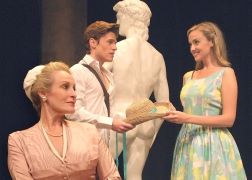 With stellar work by its three leads and its supporting players, this Light In The Piazza proves a fine introduction to the beauties of Guettel and Lucas’ exquisite chamber musical. Even those who’ve seen Piazza in more lavish settings should find themselves moved and touched by YMTA’s excellent scaled-down re-envisioning of the show.
With stellar work by its three leads and its supporting players, this Light In The Piazza proves a fine introduction to the beauties of Guettel and Lucas’ exquisite chamber musical. Even those who’ve seen Piazza in more lavish settings should find themselves moved and touched by YMTA’s excellent scaled-down re-envisioning of the show.
El Portal Forum Theatre, 5269 Lankershim Blvd. North Hollywood.
www.elportaltheatre.com
–Steven Stanley
July 10, 2009
Photos: Ed Krieger


 Since 2007, Steven Stanley's StageSceneLA.com has spotlighted the best in Southern California theater via reviews, interviews, and its annual StageSceneLA Scenies.
Since 2007, Steven Stanley's StageSceneLA.com has spotlighted the best in Southern California theater via reviews, interviews, and its annual StageSceneLA Scenies.







 COPYRIGHT 2024 STEVEN STANLEY :: DESIGN BY
COPYRIGHT 2024 STEVEN STANLEY :: DESIGN BY